Can Essential Oils Get Rid of Fruit Flies
Are you tired of dealing with pesky fruit flies buzzing around your kitchen? Essential oils may be the solution you’ve been looking for.
Learn what essential oils are, how they work against fruit flies, and the best essential oils to use. Discover DIY essential oil sprays, traps, and diffusers, along with other effective methods to help you get rid of fruit flies. Find tips on preventing future infestations. Let’s dive in and say goodbye to fruit flies for good!
Key Takeaways:
What Are Essential Oils?
Essential oils are highly concentrated plant extracts that capture the aromatic essence and beneficial properties of various plants, flowers, and herbs. They are commonly used in aromatherapy, skincare, cleaning products, and holistic medicine.
These oils are usually extracted through methods such as steam distillation, cold pressing, or solvent extraction, depending on the plant material and desired end product. The extraction process involves carefully collecting the volatile compounds that give each oil its unique scent and therapeutic benefits.
From lavender for relaxation to peppermint for enhanced focus, essential oils offer a wide range of applications. Whether diffused, applied topically, or added to bathwater, these oils can promote physical, emotional, and mental well-being.
What Are Fruit Flies?
Fruit flies, scientifically known as Drosophila melanogaster, are tiny insects that are attracted to ripe or fermenting fruits and vegetables. They are common household pests known for their rapid reproduction and nuisance.
Fruit flies lay their eggs near the surface of fermenting organic materials, providing a suitable environment for their larvae to develop. The life cycle of a fruit fly consists of four stages: egg, larva, pupa, and adult. Within a span of about 8-10 days, these pests can progress from egg to adult, enabling them to multiply swiftly, especially in warm and humid conditions.
How Do Essential Oils Work Against Fruit Flies?
Essential oils act as natural repellents against fruit flies due to their potent fragrances that disrupt the insects’ sensory receptors and navigation abilities, deterring them from infesting homes and produce.
This disruption occurs because essential oils contain volatile compounds that interact with the olfactory receptors of fruit flies, confusing their ability to locate food sources. Certain essential oils like citronella and lemongrass emit scents that fruit flies find repulsive, further driving them away.
Studies have shown that the use of essential oils as fruit fly repellents can significantly reduce infestations without the need for harmful chemicals. The anti-inflammatory and antimicrobial properties of these oils make them not only effective in repelling fruit flies but also in promoting a healthier environment.
What Are the Best Essential Oils for Getting Rid of Fruit Flies?
In terms of eliminating fruit flies, some of the best essential oils to use include eucalyptus, cinnamon, lavender, thyme, ginger, and balsam fir. These oils possess strong insect-repelling properties and pleasant scents that mask attractant odors.
Eucalyptus oil is known for its powerful insecticidal effects, deterring fruit flies effectively. Cinnamon oil is effective due to its antimicrobial properties, disrupting the breeding cycle of flies. Lavender oil not only repels fruit flies but also adds a calming fragrance to the environment. Thyme oil is a potent insecticide that targets pests like fruit flies while emitting a refreshing aroma. Ginger oil acts as a natural deterrent that fruit flies find unpleasant, keeping them away. Balsam fir oil provides a woodsy scent that repels flies while adding a touch of freshness to the surroundings.
How to Use Essential Oils to Get Rid of Fruit Flies?
Using essential oils to combat fruit flies involves creating DIY sprays, setting up diffusers, and making traps infused with potent oil blends. These methods can be strategically placed in kitchens, near drains, and in areas prone to fruit fly activity.
DIY sprays can be made by mixing essential oils renowned for their insect-repelling properties like peppermint, lemongrass, and lavender with water in a spray bottle. These concoctions can be sprayed near windows, doors, and other entry points to deter fruit flies.
Diffusers help disperse the aroma of essential oils throughout the room, creating a natural barrier against pests. Placing them in central areas of the kitchen can aid in warding off fruit flies from congregating near produce and food sources.
Traps, on the other hand, can be a powerful tool in capturing fruit flies. These traps can be made by combining a mixture of apple cider vinegar, a few drops of dish soap, and essential oils like citronella or eucalyptus in a container. By strategically positioning these traps near infested areas or breeding grounds, fruit flies can be lured in and caught.
Regularly cleaning kitchen surfaces, disposing of overripe fruits, and maintaining proper sanitation practices in cabinets and trash bins are essential complementary steps to ensure the long-term effectiveness of using essential oils in combating fruit flies.
DIY Essential Oil Spray
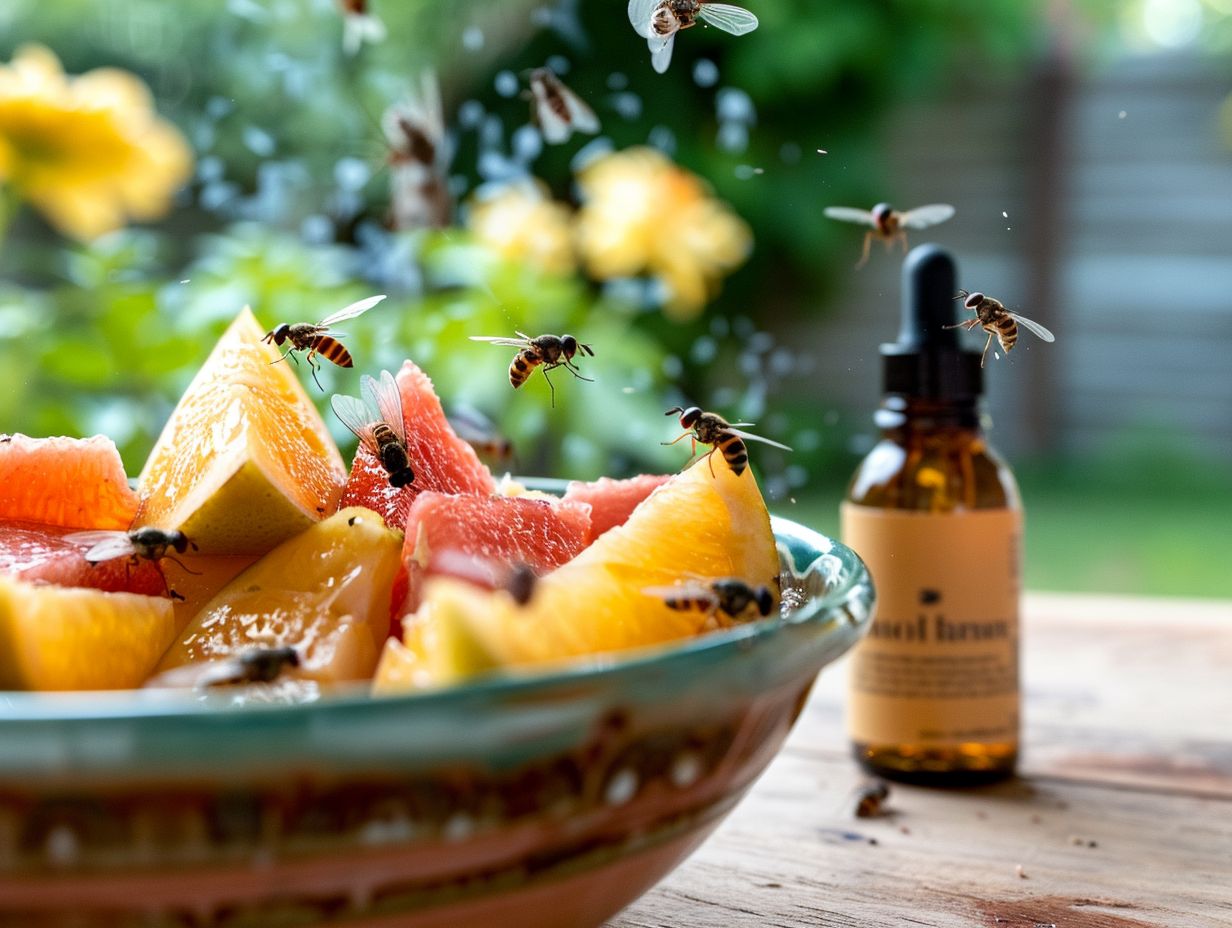
A DIY essential oil spray for fruit flies can be made by combining peppermint and geranium oils with water in a spray bottle. This natural repellent can be used in kitchens and other areas to discourage fruit fly infestations.
Mixing peppermint and geranium oils creates a potent concoction that not only repels fruit flies but also adds a pleasant fragrance to your living spaces. The strong aroma of these oils disrupts the olfactory senses of the fruit flies, deterring them from landing on fruits and other surfaces. To apply the spray effectively, concentrate on areas where fruit flies are commonly found, such as near garbage cans, fruit bowls, or compost bins.
Essential Oil Diffuser
An essential oil diffuser can be an effective tool for repelling fruit flies in the kitchen. Combining oils like peppermint and geranium with vinegar in the diffuser can create a fragrant barrier that deters these pests.
These natural remedies not only help in keeping fruit flies at bay but also provide a pleasant aroma in your living space. The use of essential oil diffusers is a chemical-free way to address pest problems, making it safe for both humans and pets. The soothing scent emitted by the diffuser can contribute to a calming atmosphere in your home, promoting relaxation and well-being. By incorporating essential oils and vinegar mixtures in your diffuser, you can ensure a pest-free environment while enjoying the therapeutic benefits of aromatherapy.
Essential Oil Trap
An essential oil trap for fruit flies can be created by combining oils like eucalyptus, cinnamon, and lavender in a jar with a fruit fly attractant. This trap effectively lures and captures these pests.
When making this DIY trap, ensure to mix these essential oils with water and a small amount of dish soap to break the surface tension and drown the fruit flies. Place the jar lid with small holes or a paper funnel to allow the flies to enter but not escape. Fruit flies are attracted to the scent of the oils and fruit, lured into the trap, and ultimately trapped inside. Experimenting with different oil combinations such as lemon, peppermint, or clove can also yield effective results in trapping fruit flies.
Are Essential Oils Safe to Use Around Food?
When used responsibly and in diluted forms, essential oils are generally safe to use around food in kitchens. It is essential to follow proper guidelines and precautions to ensure food safety.
One crucial aspect to consider is the potential interaction between certain essential oils and food items, as some oils may alter the taste or composition of dishes if not used judiciously. For instance, oils like peppermint or citrus can easily overpower delicate flavors, disrupting the intended balance of a recipe. To prevent this, always dilute essential oils properly in a carrier oil or water before adding them to food preparations.
Consider the method of application – using a dropper or pipette can help control the amount of oil being added, reducing the risk of accidental spillage or over-application. Remember, a little goes a long way with essential oils.
What Are the Other Methods for Getting Rid of Fruit Flies?
Along with essential oils, other effective methods for eliminating fruit flies include using traps baited with apple cider vinegar, dish soap solutions, and red wine. These traps target different attractants to capture and remove fruit flies.
Apple cider vinegar traps work by attracting fruit flies due to their strong and irresistible scent. The combination of the vinegar’s odor and the sweetness of the fruit flies’ favorite liquids lures them into the trap. Once inside, the dish soap solution disrupts the surface tension of the vinegar, causing the flies to drown. On the other hand, red wine traps capitalize on the fermented aroma of the wine, which entices fruit flies to enter and eventually meet the same fate as those in the vinegar traps.
Apple Cider Vinegar Trap
An apple cider vinegar trap for fruit flies can be set up by placing a mixture of vinegar, water, and a few drops of dish soap in a container.
Once the solution is ready, cover the container with plastic wrap and secure it with a rubber band. The plastic wrap acts as a barrier that the flies can enter but have a hard time escaping from. Position the trap near areas where fruit flies are frequently seen, such as near fruits, trash cans, or compost bins.
The combination of vinegar’s strong aroma, which mimics rotting fruits, and the sweetness of the apple cider makes it irresistible to these pests. When the fruit flies encounter the trap, the soap disrupts the surface tension of the liquid, causing them to sink and drown.
Regularly check the trap and empty it as needed to prevent the buildup of dead flies, ensuring the effectiveness of the trap remains high. Maintenance is key to keeping the solution attractive to fruit flies and maintaining a pest-free environment in your home.
Dish Soap Trap
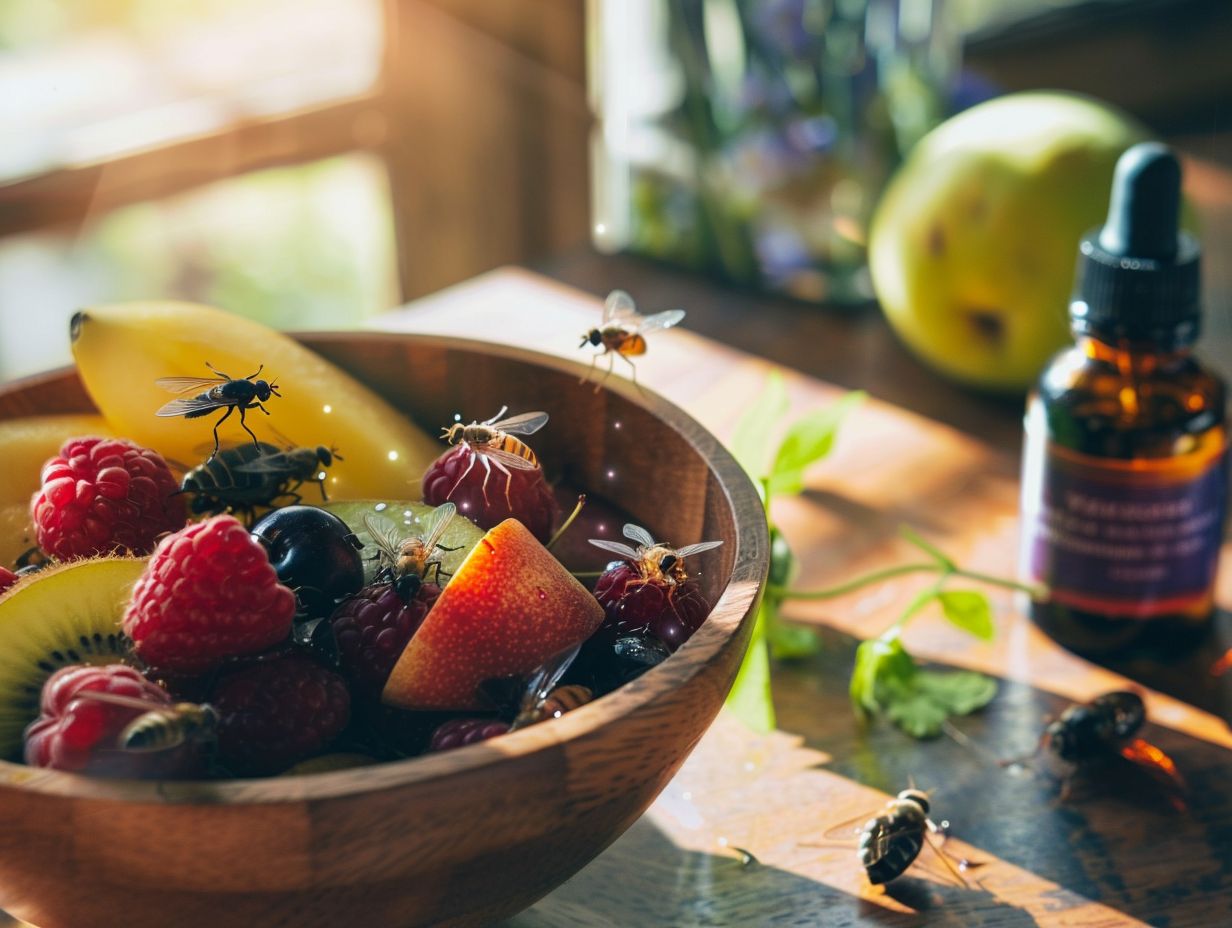
One of the primary benefits of using this method for controlling fruit flies is its simplicity and effectiveness. The soap disrupts the surface tension of the liquid, causing the flies to sink and drown rather than float on the surface. The attractive scent of fruits or vinegar added to the solution lures the flies in, making it a highly efficient trap.
To optimize the placement of the dish soap trap, consider locating it near areas where fruit flies are most active, such as near trash cans, fruit bowls, or sinks. Make sure to change the solution regularly to maintain its potency and effectiveness in trapping the pesky insects. By using this method consistently and strategically placing the traps, you can significantly reduce fruit fly populations in your home.
Red Wine Trap
A red wine trap can be constructed by filling a container with red wine and adding a few drops of dish soap.
The fruity aroma of the wine acts like a magnet for these pesky insects, luring them towards the trap. Once inside, the addition of dish soap disrupts the surface tension of the liquid, making it difficult for the fruit flies to stay afloat. Consequently, they end up getting submerged and trapped in the wine-soap mixture.
Using wine as bait for fruit flies is highly effective due to their attraction to the sweet and fermented scent of wine. They mistake it for a source of food, leading them straight into the trap. The dish soap component enhances the trap’s efficiency by eliminating the option of escape for the fruit flies, ensuring they are captured and unable to fly away.
The ingenious combination of red wine and dish soap for trapping fruit flies offers a non-toxic and environmentally friendly solution. Unlike traditional pesticides, this method poses no harm to humans, pets, or beneficial insects. It is a safe and effective way to manage fruit fly populations without resorting to chemical-laden alternatives.
How to Prevent Fruit Flies in the Future?
To avoid future fruit fly infestations, it is crucial to store fruits and vegetables properly, promptly clean up spills and ripe produce, and use mesh covers to protect open food items from attracting flies.
Maintaining a clean kitchen environment is key in preventing fruit flies from taking over your space. Regularly wiping down countertops, cleaning sinks, and disposing of garbage promptly will help eliminate any breeding or feeding grounds for these pesky insects. Another proactive measure is to ensure that all food, especially fruits and vegetables, are stored in sealed containers or refrigerated when possible. By taking these simple yet effective steps, you can significantly reduce the likelihood of encountering fruit fly infestations in your home.
Properly Store Fruits and Vegetables
Properly storing fruits and vegetables in sealed containers or the refrigerator can help deter fruit flies from laying eggs on ripe produce. Keeping the kitchen clean and organized reduces the risk of infestations.
Storing perishable items like leafy greens and berries in airtight containers can extend their freshness and prevent them from attracting pests. For root vegetables such as potatoes and onions, it’s advisable to keep them in a cool, dark place to inhibit sprouting and spoilage.
Clean Up Spills and Ripe Fruits
Promptly cleaning up spills and disposing of overripe or rotting fruits can help eliminate attractants that draw fruit flies into the home. Regular kitchen cleaning routines are essential for preventing infestations.
In terms of spills, the key is to address them immediately. Blotting up liquids, wiping surfaces, and using appropriate cleaning agents are effective strategies to avoid attracting fruit flies. Ensure that trash bins are sealed properly to prevent the buildup of organic matter that could lure pests.
Fruit disposal is equally crucial, as fruits past their prime serve as breeding grounds for fruit flies. Practice proper waste management by disposing of fruits in sealed bags or containers, and regularly empty the compost bin to discourage infestations.
Use Mesh Covers for Open Food
Using mesh covers or food nets to shield open food items from exposure can prevent fruit flies from accessing and laying eggs on perishable goods. These barriers add an extra layer of protection against infestations.
Mesh covers are not only effective in keeping out fruit flies but also other pests like ants and bees. For items that need ventilation, consider using mesh domes that allow for air circulation while keeping insects at bay. Another option for larger dishes or platters is a mesh food tent that offers a wider coverage area. By utilizing these different cover options, you can maintain the quality and freshness of your food without the worry of contamination. Remember, investing in physical barriers is key to ensuring food safety at outdoor gatherings and picnics.
Frequently Asked Questions
Can essential oils really get rid of fruit flies?
Yes, essential oils have been proven to be an effective natural remedy for repelling and eliminating fruit flies.
Which essential oils are most effective for getting rid of fruit flies?
Peppermint, lemon, eucalyptus, and clove essential oils are some of the most effective oils for repelling and killing fruit flies.
How do I use essential oils to get rid of fruit flies?
Mix a few drops of your chosen essential oil with water in a spray bottle and spray it around areas where fruit flies are commonly found, such as the kitchen or near fruit bowls.
Can I use essential oils on my fruits to repel fruit flies?
Yes, you can add a few drops of essential oil to a bowl of fruit to keep fruit flies away. Just make sure to wash the fruit thoroughly before consuming.
Are essential oils safe to use around food and children?
Yes, essential oils are safe to use around food and children as long as they are properly diluted and used in moderation. It is important to keep them out of reach of young children.
How long does it take for essential oils to get rid of fruit flies?
The effectiveness of essential oils in getting rid of fruit flies may vary, but typically it can take a few days to a week to see noticeable results. It is important to consistently use the oils and keep the affected areas clean.

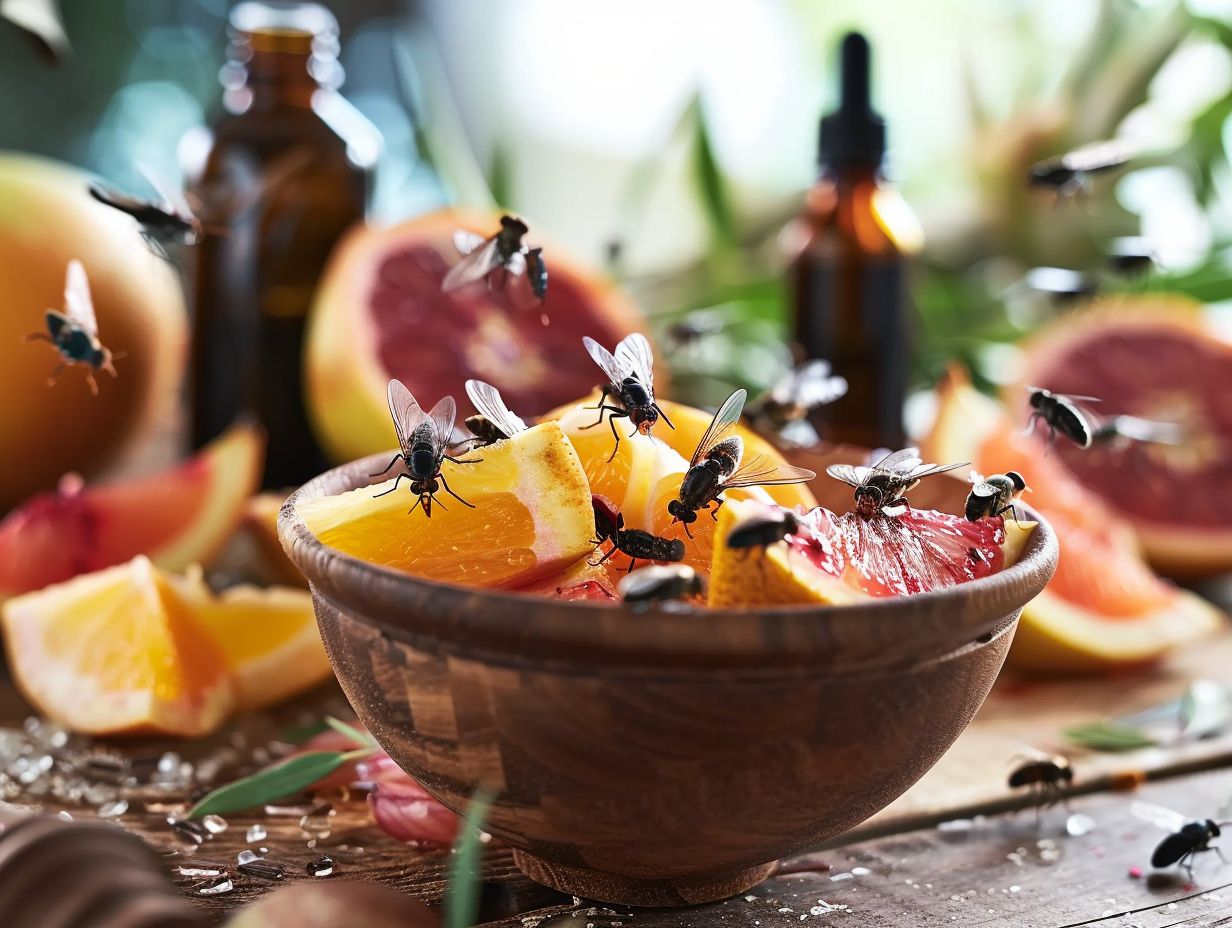
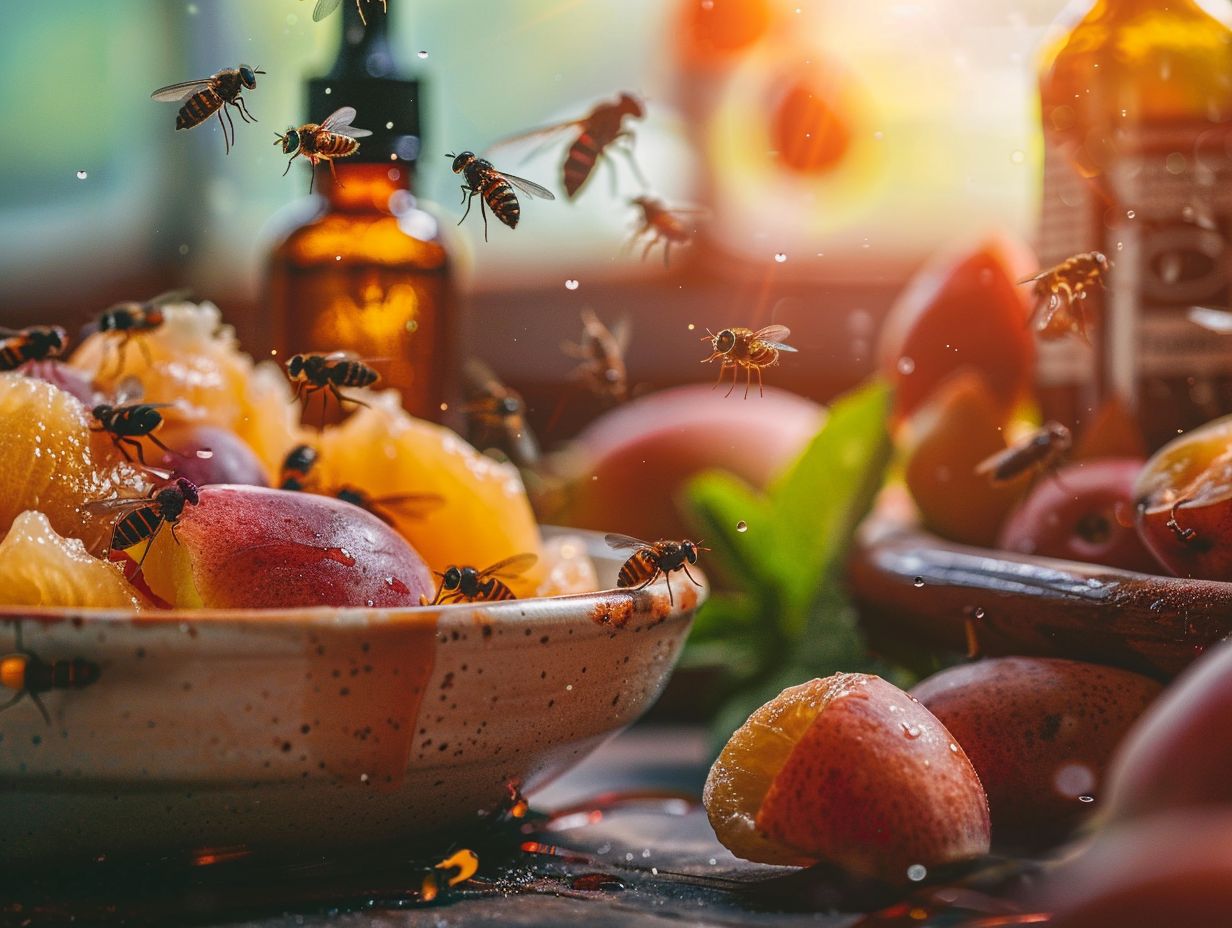

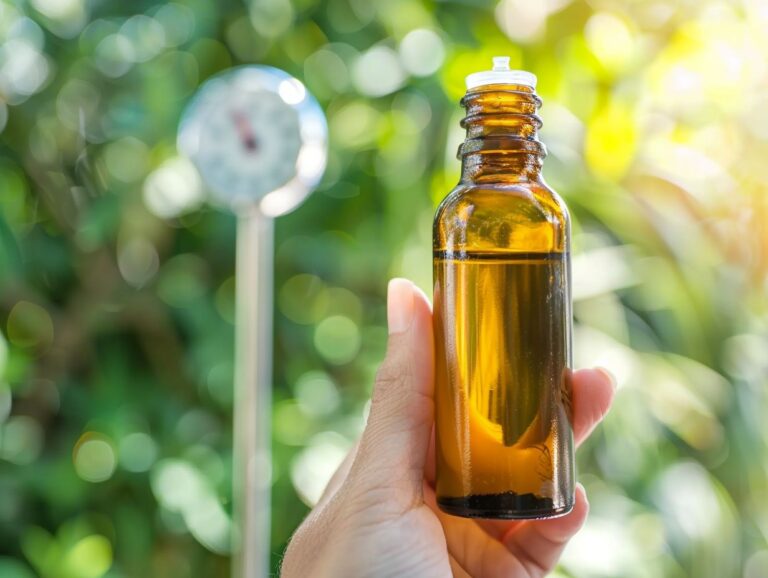
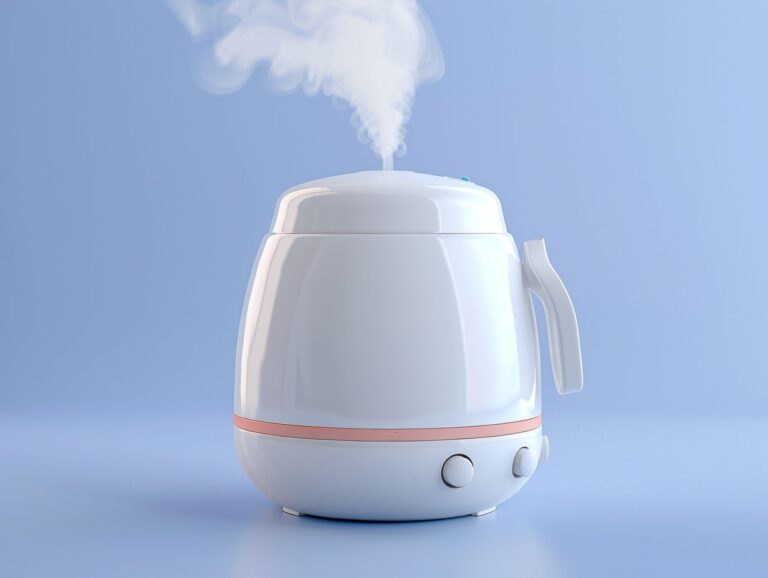



2 Comments